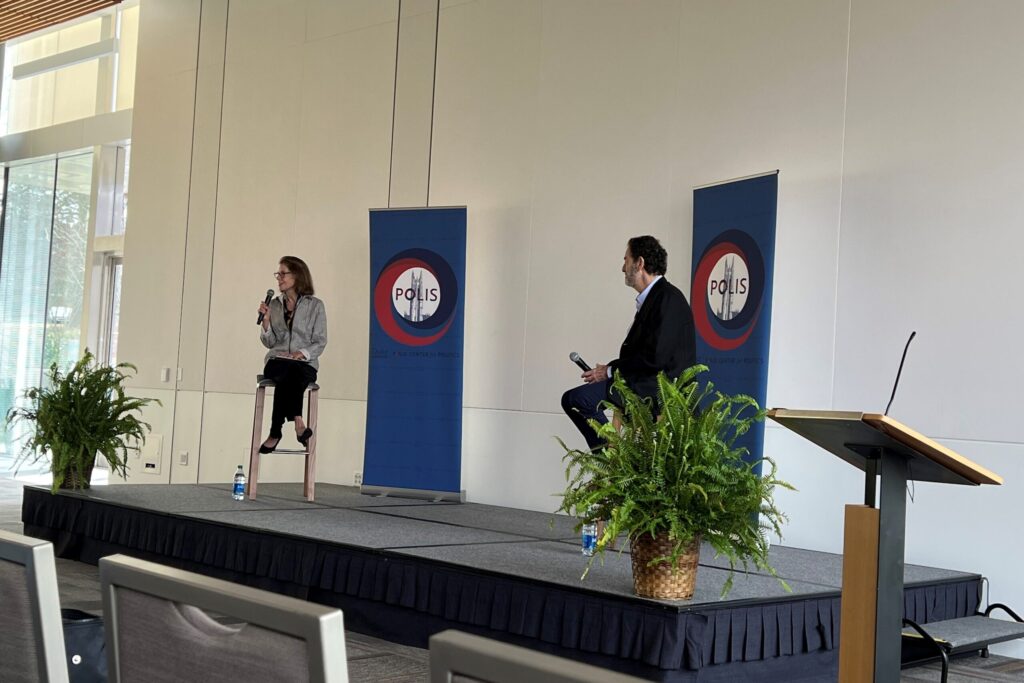
A Conversation with Joel Benenson, Political Strategist and CEO, Benenson Strategy Group
February 8, 2022
12:00 pm - 1:00 pm
Location
Share this event

Polis Distinguished Fellow Ambassador Miriam Sapiro hosted political strategist and pollster Joel Benenson. They discussed his work on presidential campaigns–including those of President Obama, Secretary Clinton, and Mayor Buttigieg—and ways to combat the division and polarization that have come to dominate our political landscape. Described as “one of the leading strategists in the world for campaigns,” Mr. Benenson is an award-winning researcher and pollster.
From Presidential Campaigns to Corporate Public Relations Strategizing, How Do You Use Polling to Win Over People’s Hearts and Minds?
This was the question American pollster and political strategist Joel Benenson attempted to answer during an hour-long talk with Polis Distinguished Fellow Ambassador Miriam Sapiro on February 8. Benenson’s unique perspective on the importance of qualitative data for persuasive messaging was a refreshing reminder that the art of politics cannot be reduced to number crunching.

As the CEO of Benenson Strategy Group, a market research and consulting firm that works with political campaigns, corporations, and nonprofits, Benenson has extensive experience using research to create effective public relations campaigns. He is well known for the research and polling programs he used to help former President Barack Obama in his 2008 and 2012 campaigns for president.
Despite his laundry list of political achievements, Benenson did not start his career in polling and consulting. Instead, he started in the beer distributorship business, where he learned what matters most to working- and middle-class people. Once he transitioned to politics, this experience helped shape his political and corporate strategizing. The industry taught him how to appeal to American voters: address their values and emotions on the issues that matter most.
Benenson has developed a unique approach to polling and campaigning, winning awards for the qualitative research he conducts. Unlike most modern pollsters who emphasize the use of data analytics for campaign strategizing, Benenson emphasizes the importance of focus groups and primary polling. He codes the data to determine what issues will matter most to voters in the upcoming election. His strategy suggests that the best way to win over American voters is to appeal to the issues and values they care about most. In other words, political campaigning is an emotional science, not a purely mathematical one.
Coming into this talk, I expected to hear about how data collection can be used to predict voter behavior. Maybe he will discuss the most recent breakthrough in statistical modeling that has enabled pollsters to better predict elections, I thought. Instead, I was surprised to hear Benenson argue that pollsters who focus solely on data analytics miss the mark. Hillary Clinton’s campaign was a case in point: they lost the key swing states of Wisconsin, Pennsylvania, and Michigan because their team focused solely on data analytics. Benenson argues that data analytics must be used in conjunction with primary polling and focus groups to determine what really matters to key voting demographics. The outcome of the Clinton campaign reminds us of what makes political persuasion so difficult: the passions of American voters can’t be reduced to a single statistical model.
Benenson’s strategy also focuses on identifying persuadable groups like moderates and independents. I found these remarks particularly inspiring, given the increasingly polarized moment we find ourselves in. As Americans move further apart on key political issues, the idea that there exists room for persuasion and civil debate almost seems fictitious. However, Benenson has proved it, time and time again, through his numerous successful campaigns. Through research, he argues, politicians can identify who will be most responsive to particular messaging. Benenson does not believe that persuasion is impossible; instead, he believes that with the right emotional appeals, campaigns can win over the minds of voters.
Benenson’s experience provides encouragement for those of us looking into a career in politics: politics can’t be reduced to numbers. For those of us hoping to work on a public relations campaign, we can rest assured that our jobs will not be taken by a statistical model anytime soon. Instead, we should work with data scientists to produce the most effective predictive models possible. And, we shouldn’t be afraid to explore the beer distributorship industry while we’re at it.
This event recap was written by Chloe Nguyen (PPS ’24).

